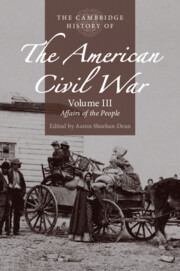Book contents
- The Cambridge History of the American Civil War
- The Cambridge History of the American Civil War
- The Cambridge History of the American Civil War
- Copyright page
- Contents
- Plates
- Figures
- Contributors to Volume III
- Note on the Text
- Part I Values
- Part II Social Experience
- Part III Outcomes
- 14 Making Peace
- 15 Reconstruction during the Civil War
- 16 Veterans and the Postwar World
- 17 The Civil War and the American State
- 18 The Civil War and American Law
- 19 The Civil War in Visual Art
- 20 The Civil War in American Thought
- 21 The Civil War in Literary Memory
- 22 The Civil War in Film
- 23 The Civil War in Public Memory
- Index
- Plate Section (PDF Only)
- References
18 - The Civil War and American Law
from Part III - Outcomes
Published online by Cambridge University Press: 11 October 2019
- The Cambridge History of the American Civil War
- The Cambridge History of the American Civil War
- The Cambridge History of the American Civil War
- Copyright page
- Contents
- Plates
- Figures
- Contributors to Volume III
- Note on the Text
- Part I Values
- Part II Social Experience
- Part III Outcomes
- 14 Making Peace
- 15 Reconstruction during the Civil War
- 16 Veterans and the Postwar World
- 17 The Civil War and the American State
- 18 The Civil War and American Law
- 19 The Civil War in Visual Art
- 20 The Civil War in American Thought
- 21 The Civil War in Literary Memory
- 22 The Civil War in Film
- 23 The Civil War in Public Memory
- Index
- Plate Section (PDF Only)
- References
Summary
During the Civil War and in its aftermath, Americans experienced and undertook the most comprehensive reconsideration of their government, society, and laws since the constitutional convention in 1787. As Republican Representative Daniel Morris of New York announced to his fellow congressmen in May 1864, urging them to vote for a resolution to send to the states for ratification an amendment to abolish slavery, they faced a “moment of greater responsibility than has devolved upon a like body since the year 1776.” By the time Morris said these words, the United States had endured over three years of bloody Civil War during which time President Abraham Lincoln had declared free millions of slaves pursuant to the Emancipation Proclamation, thousands of black men filled the Union army’s ranks, and Congress had been considering how to make freedom national. The federal government had suspended the writ of habeas corpus, conscripted men into the armed forces, and imposed the first national income tax to help pay for the conflict. And, Republicans in Congress passed wide-ranging domestic and economic measures ranging from bank and currency reform to the chartering of the first transcontinental railroad as well as programs designed to foster higher education and promote development of land in the western states.
- Type
- Chapter
- Information
- The Cambridge History of the American Civil War , pp. 372 - 396Publisher: Cambridge University PressPrint publication year: 2019



